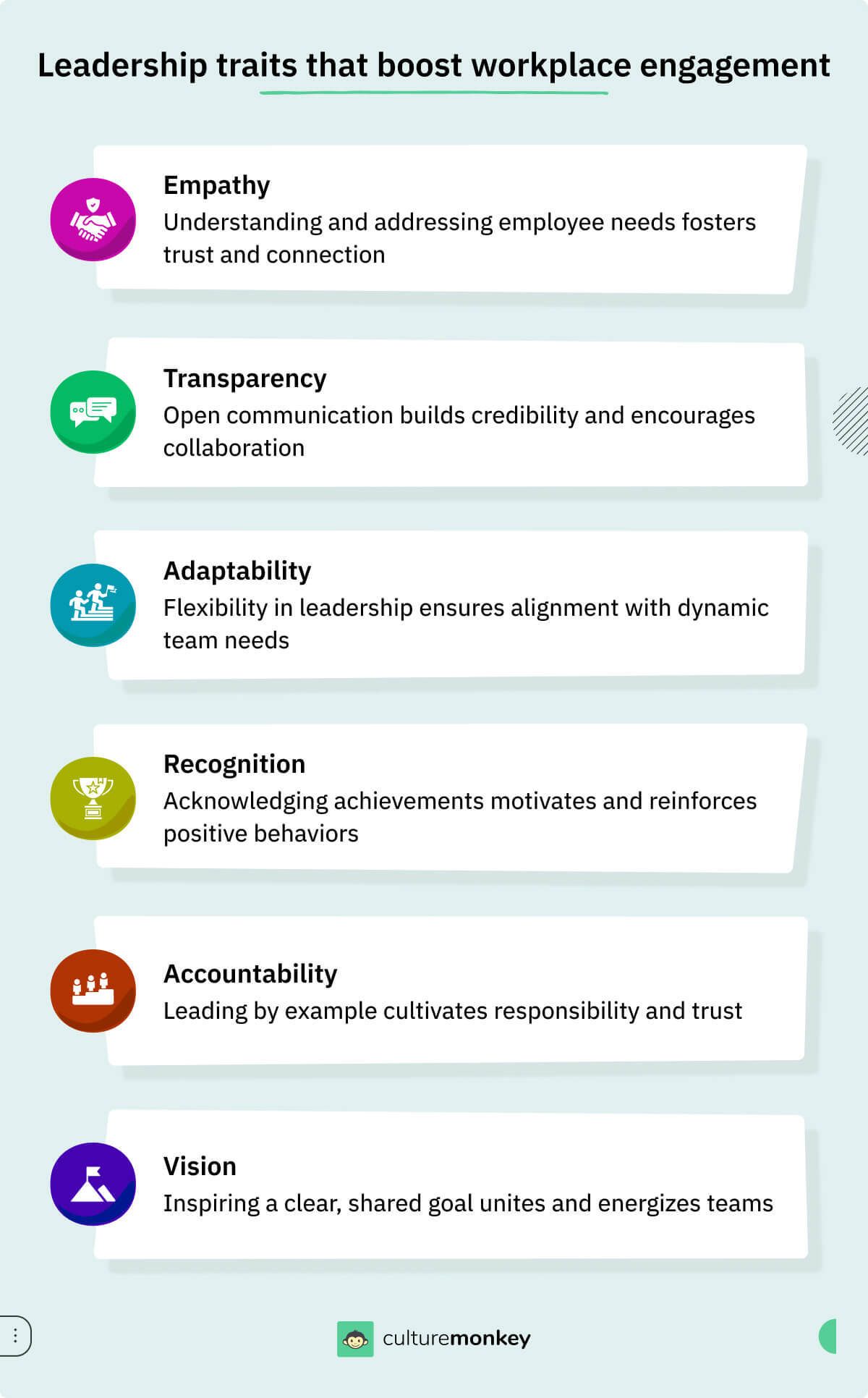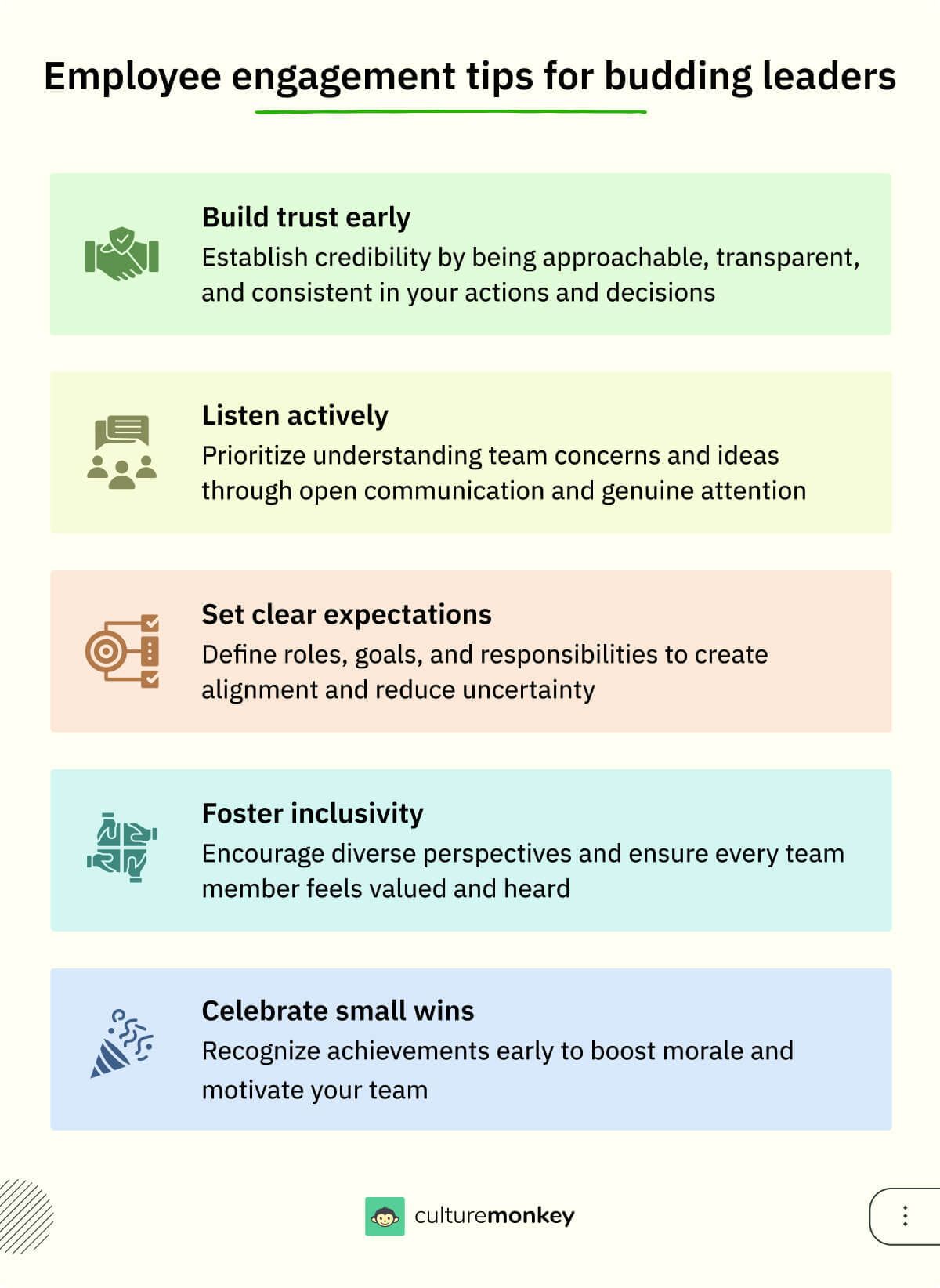How leadership shapes employee engagement: Tips and survey questions

In 2008, when Airbnb faced a financial crisis, its leaders didn’t retreat—they rallied their team. By fostering open communication, sharing the company’s challenges transparently, and involving employees in finding solutions, they turned things around.
Airbnb's leaders sold branded cereal boxes to raise funds, practiced radical transparency, involved employees in solutions, and rebuilt trust. This wasn’t just leadership in action; it was a masterclass in driving engagement through trust and collaboration.
In workplaces everywhere, leadership has this power. The way leaders connect with their teams, address challenges, and inspire action determines how engaged and motivated employees feel. But what exactly is the impact of leadership on employee engagement? Let’s break it down.
Blog Highlights


How does your leadership impact your employee engagement?

A leader’s actions, decisions, and attitudes cascade down, shaping the culture and directly influencing employee motivation.
- Have a shared purpose with your employees - Giving employees a shared purpose to work and making them believe in the vision they are working for is of paramount importance to garner their engagement. A leader should think about ways to inspire and motivate their teams to achieve organizational goals and at the same time, should promote every employees’ personal growth.
- Mentor and coach your employees - Supporting and guiding your employees in whatever task they do goes a long way in establishing engagement in a team. As a leader, you need to empower your employees by providing them with ample growth and development opportunities.
- Bring clarity in your communication - As a leader, you need to communicate the organizational goals with utmost clarity to your employees and make sure that you are easily accessible for any clarifications from your team. And a large part of establishing good communication with your team involves listening to them because that will give you insights about their struggles and will help you devise a solution for them.
- Bring in positivity - Being optimistic and bringing positivity to your team in tough times is a critical quality of a great leader. As a leader, your positivity in a team environment will motivate employees to tackle any kind of work situation. Even small acts like caring about their health and personal lives and being friendly to them can go a long way in improving your employee engagement.
- Be empathetic and flexible - Empathy plays a quintessential role in employee leadership, and great leaders would always imagine themselves in the shoes of their employees before setting up any policies or assigning tasks to their employees. Also, displaying empathy improves trust amongst employees and will positively influence their engagement levels.



Of all the things I’ve done, the most vital is coordinating those who work with me and aiming their efforts at a certain goal.
Founder
Disney
Importance of leadership in employee engagement

Effective leadership ensures alignment between individual and organizational goals, empowering employees to perform at their best. Here’s the role of leadership in employee engagement:
- Creating a culture of ownership: Leaders who delegate authority and involve employees in decision-making foster a sense of ownership. This approach encourages employees to take initiative and feel responsible for their contributions, boosting engagement.
- Modeling resilience and positivity: Leaders who remain composed and optimistic during challenging times set a powerful example for their teams. This resilience inspires employees to stay motivated and engaged, even in tough situations.
- Bridging cross-functional collaboration: Strong leaders facilitate collaboration between teams, breaking silos and encouraging collective problem-solving. This interconnectedness promotes a sense of belonging and shared purpose among employees.
- Championing diversity and inclusion: Inclusive leaders who value diverse perspectives create an environment where all employees feel respected and valued. This inclusive atmosphere directly impacts engagement by fostering trust and reducing barriers.
- Providing continuous feedback loops: Leaders who prioritize regular, constructive feedback help employees understand their progress and areas for improvement. This clarity reinforces individual growth and strengthens engagement.
- Adapting to individual needs: Leadership that tailors its approach to accommodate diverse employee preferences and career goals shows genuine care. Personalized support builds stronger connections and boosts employee morale.
Benefits of high employee engagement

Engaged employees are more committed, motivated, and aligned with company goals, driving tangible benefits. Here are the key advantages of fostering high engagement levels:
- Improved productivity: Engaged employees exhibit higher levels of focus and enthusiasm in their work. They are more likely to go the extra mile, resulting in increased output and superior quality of work.
- Enhanced innovation: A highly engaged workforce is more likely to share ideas and embrace creativity. Employees who feel valued and connected are motivated to contribute innovative solutions that propel the organization forward.
- Stronger employer brand: Engaged employees act as brand ambassadors, sharing positive experiences that enhance the company’s reputation. This helps attract top talent and strengthens the organization’s competitive edge in the job market.
- Lower absenteeism rates: When employees feel connected and satisfied, they are less likely to take unscheduled absences. This ensures consistent team performance and minimizes disruptions to operations.
- Higher customer satisfaction: Engaged employees provide better customer service, as they are more invested in representing the organization positively. This directly impacts customer loyalty and long-term business growth.
- Resilience during challenges: Engaged teams are more adaptable and resilient in the face of adversity. Their commitment helps sustain morale and productivity during challenging times, ensuring organizational stability.
The key skills leaders need to engage their teams

Here are the essential skills leaders need to engage their teams:
- Active listening: Leaders must listen to their teams with intent, acknowledging their concerns and ideas. Active listening ensures employees feel heard, which builds trust and strengthens their connection to the organization.
- Emotional intelligence: Understanding and managing one’s emotions, as well as recognizing and influencing the emotions of others, is vital. Leaders with high emotional intelligence can empathize with their teams, fostering strong relationships and engagement.
- Conflict resolution: Addressing conflicts constructively is crucial for maintaining harmony within teams. Skilled leaders manage disagreements effectively, ensuring that conflicts do not disrupt engagement or productivity.
- Adaptability: The ability to adjust leadership styles based on team dynamics and situational demands is essential. Adaptable leaders can better meet the evolving needs of their employees, keeping them engaged and motivated.
- Empowering delegation: Leaders who delegate not only tasks but also decision-making authority empower their teams to take ownership. This sense of autonomy drives accountability and engagement.
- Visionary thinking: Articulating a compelling vision inspires employees to align their efforts with organizational goals. Visionary leaders motivate teams by showing how their contributions impact the bigger picture.

Challenges leaders face in driving engagement (and how to overcome them)

Driving employee engagement is a crucial but challenging task for leaders, as it requires balancing organizational goals with individual needs. Recognizing these challenges and addressing them effectively can help leaders build a more engaged and motivated workforce. Here are some common obstacles and strategies to overcome them:
Lack of individualized approaches
- Challenge: Treating all employees the same can alienate those with unique needs or goals.
- Solution: Implement personalized engagement strategies by understanding individual motivators through one-on-one conversations and tailored feedback.
Overcoming resistance to change
- Challenge: Employees may resist new initiatives or changes in work processes.
- Solution: Leaders should communicate the benefits of changes clearly and involve employees in the transition process to foster buy-in.
Limited time for engagement activities
- Challenge: Leaders often struggle to balance their workload with employee engagement efforts.
- Solution: Use engagement tools or platforms to streamline processes like surveys and feedback collection, ensuring efforts are efficient and impactful.
Addressing generational differences
- Challenge: Diverse workforces may have varying engagement needs based on generational values.
- Solution: Adopt a flexible leadership style that accommodates different preferences, from digital communication for younger employees to face-to-face interactions for older generations.
Ensuring consistent recognition
- Challenge: Sporadic recognition can make employees feel undervalued.
- Solution: Develop a structured recognition program to have manager recognize and celebrate achievements regularly, reinforcing positive behaviors.
How leadership style affects employee engagement

Leadership style plays a significant role in shaping employee engagement, as it directly impacts how employees perceive their work environment, relationships, and motivation. Different leadership approaches influence engagement in unique ways. Here’s how:
- Transformational leadership drives inspiration: Transformational leaders focus on motivating employees through a shared vision and clear goals. By inspiring innovation and recognizing individual achievements, they cultivate a highly engaged and forward-thinking team.
- Autocratic leadership may stifle creativity: Leaders who rely on a top-down, directive approach can hinder engagement by limiting employee autonomy. While this style may work in crisis situations, prolonged use can lead to disengagement and dissatisfaction.
- Democratic leadership fosters collaboration: Involving employees in decision-making processes encourages a sense of ownership and accountability. Democratic leaders enhance engagement by valuing team input and creating a culture of mutual respect.
- Servant leadership builds trust: By prioritizing the needs of employees and removing obstacles, servant leaders create a supportive environment. This style strengthens trust and loyalty, leading to higher engagement levels.
- Laissez-Faire leadership requires balance: Providing employees with autonomy to make decisions can empower and engage them. However, excessive hands-off leadership without guidance may lead to confusion and reduced morale.
- Charismatic leadership encourages enthusiasm: Leaders with a charismatic style inspire energy and enthusiasm in their teams. While effective in short bursts, a lack of follow-through can reduce sustained engagement.
The connection between leadership and engagement levels
Leaders play a central role in influencing engagement levels, as their actions, communication, and decisions directly impact how employees feel about their work and the organization. Here are specific ways leaders can affect engagement levels:
- Setting the emotional tone: Leaders’ attitudes and emotional stability set the tone for the workplace. Positive, approachable leaders create an optimistic environment that encourages employees to stay motivated and engaged.
- Encouraging proactive problem-solving: Leaders who empower employees to address challenges independently foster a sense of responsibility and confidence. This proactive culture drives engagement by making employees feel trusted and capable.

- Building transparency in decision-making: When leaders are transparent about decisions, goals, and challenges, they build trust within the team. Employees are more engaged when they understand the rationale behind organizational actions.
- Promoting continuous learning: Leaders who provide opportunities for skill development and career growth show commitment to their employees’ future. This focus on growth boosts engagement by aligning individual aspirations with organizational support.
- Addressing feedback constructively: Leaders who actively seek and act on feedback demonstrate a willingness to improve. This two-way communication encourages employees to share ideas, fostering a sense of inclusion and engagement.
- Ensuring fairness in treatment: Leaders who treat employees fairly, avoiding favoritism or bias, create a level playing field that enhances trust and engagement across the team.
3 Ways to improve engagement as a leader

Improving employee engagement as a leader requires deliberate action and a focus on building meaningful connections with your own team members. By fostering trust, open communication, and opportunities for growth, leaders can significantly enhance engagement levels. Here are three effective strategies:
1. Foster psychological safety
Creating an environment where employees feel safe to express ideas, ask questions, and voice concerns without fear of judgment is vital. Leaders can build psychological safety by encouraging open discussions, actively listening, and addressing feedback constructively. This approach boosts confidence and encourages employees to feel supported and to take initiative, driving engagement.
2. Personalize recognition efforts
Generic recognition often feels impersonal and less impactful. Leaders can improve engagement by recognizing employees in ways that resonate with them personally, such as acknowledging specific contributions publicly or celebrating achievements with tailored rewards. This targeted appreciation reinforces positive behaviors and strengthens team morale.
3. Support work-life integration
Engaged employees thrive when their personal and professional lives are balanced. Leaders can encourage this balance by providing flexible work options, respecting boundaries, and promoting wellness initiatives. Demonstrating genuine concern for employees’ well-being fosters loyalty and motivates them to remain committed to their roles.
Innovative leadership approaches

Innovative leadership approaches are essential for navigating today’s dynamic business environment. By adopting forward-thinking strategies, leaders can inspire creativity, improve engagement, and drive organizational success. Here are some modern leadership approaches that foster innovation and adaptability:
- Design thinking leadership: Leaders using design thinking focus on understanding employees’ needs, brainstorming solutions, and iterating improvements. This approach fosters a culture of experimentation and encourages employees to participate in problem-solving processes.
- Servant leadership in action: While servant leadership isn’t new, integrating it with modern tools like engagement platforms amplifies its impact. Leaders prioritize their team’s needs by leveraging data insights to personalize support and remove obstacles, enhancing team performance.
- Agile leadership: Agile leaders thrive in fast-paced environments by embracing flexibility and iterative planning. They empower teams to adapt quickly to changes, making the organization more resilient and innovation-friendly.
- Inclusive leadership practices: Innovative leaders focus on building diverse and inclusive teams. They encourage open dialogue, seek diverse perspectives, and ensure all employees feel valued, which drives creativity and better decision-making.
- Digital-first leadership: With technology reshaping workplaces, leaders who leverage digital tools to streamline processes, enhance communication, and foster virtual collaboration create a forward-thinking and efficient work environment.
- Growth mindset advocacy: Leaders promoting a growth mindset encourage continuous learning and celebrate effort alongside outcomes. This approach reduces fear of failure and motivates employees to take on new challenges confidently.



Be the leader you wish you had.
Author, speaker, and CEO
The Optimism Company
20+ Employee leadership survey questions
Leadership and employee engagement questionnaire are essential for understanding how leaders influence engagement, performance expectations and team dynamics. By asking the right questions, organizations can uncover areas for improvement and align leadership practices with employee needs.
- Do you believe that your team leader has been communicating well with you and is linking the company strategy/vision to your work?
- Is your team leader always accessible to you to guide you and resolve your work-related issues?
- Do you believe that your manager cares about both your professional and personal growth?
- Does your manager help you in facilitating the things you need to achieve your organizational goals?
- Do you believe that your managers take your feedback seriously and help to resolve your issues in the workplace?
- Do you believe your manager is being empathetic and flexible to you?
- Do you believe that your manager creates a positive work culture in your team?
- Does your manager give equal attention and importance to your entire team without any bias?
- Do you think your manager often provides you constructive feedback on what could be improved about your work?
- What do you think as a management team we should do to improve your work experience with your leader?
- Do you feel that your manager encourages open communication and allows you to voice your opinions without fear of negative repercussions?
- Does your manager actively involve the team in decision-making processes that impact your work?
- Do you believe your manager effectively recognizes and rewards individual contributions and team achievements?
- Is your manager proactive in identifying and addressing challenges faced by the team?
- Does your manager support your career advancement by providing opportunities for learning and development?
- Do you think your manager demonstrates strong problem-solving skills and guides the team effectively during challenges?
- Do you feel that your manager respects and values diversity within the team?
- Does your manager take steps to ensure a fair distribution of workload among team members?
- Do you feel your manager sets clear expectations and provides adequate resources to meet those expectations?
- Do you believe your manager fosters collaboration and teamwork within your department?
- Does your manager encourage innovation and support you in trying out new ideas or approaches to your work?
- Do you feel your manager is committed to creating a work-life balance for the team by respecting boundaries and personal time?
Measuring the impact of leadership development on engagement

Measuring the impact of leadership research and development on employee engagement is critical to ensuring that investment in training translates into meaningful workplace improvements. Effective evaluation highlights areas of success and opportunities for further growth. Here are key ways to measure this impact:
- Track changes in employee engagement scores: Conduct engagement surveys before and after leadership development programs to identify shifts in metrics such as job satisfaction, morale, and alignment with organizational goals.
- Monitor retention rates: Improved leadership often correlates with lower turnover. By tracking retention rates over time, organizations can assess if leadership development initiatives are helping to create a more committed workforce.
- Evaluate team performance metrics: Enhanced leadership should lead to improved team productivity, quality of work, and goal attainment. Regularly reviewing these metrics can provide insight into the effectiveness of leadership development.
- Analyze feedback from direct reports: Collect qualitative feedback from employees on their experiences with leaders post-training. Look for trends in areas such as communication, support, and clarity of expectations.
- Measure conflict resolution effectiveness: A reduction in workplace conflicts or a more constructive approach to resolving disputes can indicate that leadership skills have improved.
- Assess leader self-evaluation reports: Encourage leaders to reflect on their development progress through structured self-assessment tools. These insights can align with other data to provide a comprehensive view.
Conclusion
Leadership profoundly impacts employee engagement, shaping how individuals perceive their roles, relationships, and the organization as a whole. By demonstrating empathy, clear communication, and consistent support, leaders can create an environment where employees feel empowered, motivated, and aligned with organizational goals.
However, achieving this level of engagement requires intentional effort and actionable insights. Employee engagement surveys are an invaluable tool for understanding how leadership practices influence the workplace and identifying areas for growth.
Start by leveraging CultureMonkey's comprehensive employee engagement platform to gather meaningful feedback. Visit CultureMonkey today to empower your leaders, drive engagement, and unlock the full potential of your workforce.
Summary
Leadership-focused employee survey questions are crucial for understanding and improving team engagement. By gathering feedback on leadership behaviors and their impact, organizations can identify strengths, address gaps, and align leadership strategies with employee needs.
This process fosters trust, enhances communication, and drives a culture of accountability. Effective leadership engagement leads to motivated teams, improved performance, and sustained organizational success.
FAQs
1. What is the role of leadership in fostering employee engagement and inclusion?
Leadership plays a pivotal role in fostering engagement and inclusion by creating a culture of openness, respect, and belonging. Inclusive leaders actively listen to employees, value diverse perspectives, and ensure equitable opportunities for all. By demonstrating empathy, transparency, and fairness, leaders build trust and collaboration, empowering employees to contribute their best, which drives both professional growth and engagement and inclusion in the workplace.
2. What impact does leadership style have on employee satisfaction?
Leadership style significantly shapes employee centered leadership satisfaction by influencing workplace culture and relationships. Transformational leaders inspire and align employees with a vision, boosting morale, while democratic leaders foster collaboration and involvement. Conversely, autocratic styles can suppress innovation and morale. Leaders who adapt their style to team needs while maintaining fairness and support create an environment that fosters satisfaction and long-term engagement.
3. Can leadership training programs improve engagement across teams?
Leadership training programs enhance engagement by equipping leaders with essential skills such as communication, conflict resolution, a management approach and emotional intelligence. Trained leaders can better inspire teams, set clear goals, and recognize individual contributions. These programs help leaders address team challenges effectively, building trust and motivation, which collectively improve engagement levels across teams, regardless of their dynamics or challenges.
4. How can leadership drive engagement in a hybrid or remote work environment?
In hybrid or remote settings, leaders drive engagement by prioritizing consistent communication, virtual collaboration, and flexibility. Clear expectations, regular check-ins, and recognition of achievements help employees feel connected and valued. Empathetic leaders who address remote work challenges, provide the right tools, provide constructive feedback, and foster team inclusivity ensure a motivated and engaged workforce, even in non-traditional work setups.
5. What leadership qualities drive higher levels of engagement?
Leadership qualities like empathy, adaptability, communication, and transparency are key drivers of engagement. Empathetic leaders understand individual needs, while adaptable and effective leaders address dynamic workplace challenges. Clear communication ensures alignment, and transparency fosters trust. Leaders with these qualities create a supportive and inspiring environment where employees feel valued, motivated, and committed, resulting in higher engagement levels and stronger team performance.




